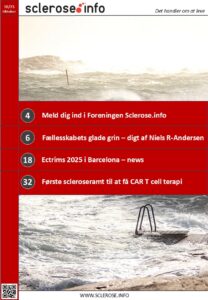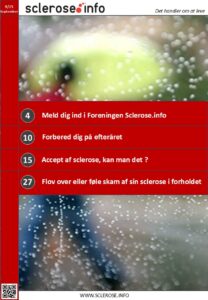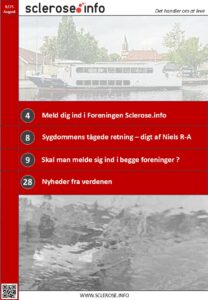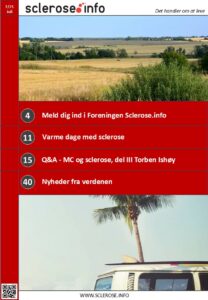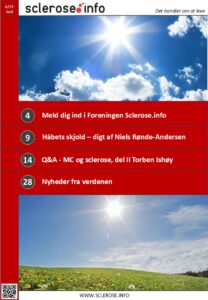The alemtuzumab trial data continue to suggest a potentially new and exciting treatment for patients with early, active multiple sclerosis, says Alastair Compston, Professor of Neurology and the head of the Department of Clinical Neurosciences at the University of Cambridge, United Kingdom, and the study’s principal investigator. This randomized study confirms findings from prior studies demonstrating that treatment with alemtuzumab can have a profound and durable impact on patients with relapsing-remitting multiple sclerosis, including restoring some lost function in many patients.
Symptoms of multiple sclerosis result from an immune system attack on the protective insulation surrounding nerve fibers of the central nervous system. We believe alemtuzumab shuts down this immune system attack, treating the disease at its root cause, says Alasdair Coles, Senior Lecturer, Department of Clinical Neurosciences, University of Cambridge and a lead investigator in the study.
Common non-serious adverse events in the trial included infusion-associated reactions in the alemtuzumab patients and flu-like symptoms in patients using Rebif. Alemtuzumab-treated patients were more likely than Rebif patients to experience infections, which were predominantly mild to moderate in severity, as well as autoimmune thyroid disease. Three percent of alemtuzumab-treated patients developed the potentially serious autoimmune adverse event immune thrombocytopenic purpura (ITP), a disorder characterized by a low platelet count and corresponding increased risk of uncontrolled bleeding. Additional study and trial safety information is below.
The trial was larger and follow-up was longer than the typical Phase 2 trial in multiple sclerosis. It is important to note that we compared the investigative drug directly against a widely used therapy rather than against placebo. The trial did not show an increased risk of life-threatening or opportunistic infections, but a proportion of alemtuzumab patients experienced new autoimmune disease. We have been able to create a robust patient monitoring program that allows us to proceed into our two international Phase 3 trials with greater assurance on safety associated with patient management, says Dr. Richard Moscicki, chief medical officer for Genzyme.
According to the National Multiple Sclerosis Society, approximately 400,000 Americans acknowledge having MS, and every week about 200 people are diagnosed. Worldwide, multiple sclerosis may affect 2.5 million individuals. The disease causes a wide range of symptoms including difficulty with walking, numbness, fatigue and impairment of vision, and progresses to permanent, severe disability in the majority of patients. Relapsing-remitting MS is the most common presenting form of the disease.
We are pleased to see potential new treatment options move positively through the MS pipeline, says Dr. John Richert, executive vice president for research and clinical programs at the National Multiple Sclerosis Society, and as alemtuzumab is moved into Phase 3 studies, we hope that individuals with MS will consult with their physicians to assess whether they are appropriate patients and if so will consider the pros and cons of participating in these important clinical trials.
Additional New Top-Line Data
New and previously unreported top-line data from secondary analyses of the CAMMS223 Phase 2 clinical trial, presented last month at the World Congress on Treatment and Research in Multiple Sclerosis (WCTRIMS), revealed that the proportion of clinically disease-free patients was significantly higher in the alemtuzumab group than in the Rebif group at year one (86 percent vs. 63 percent), year two (81 percent vs. 48 percent), and year three (71 percent vs. 39 percent, p-values <0.0001). Clinically disease-free, was defined as the absence of both relapses and sustained accumulation of disability during the time-period assessed.
The top-line data from WCTRIMS also showed that the proportion of patients free of sustained accumulation of disability over a six-month period was also significantly greater in the alemtuzumab group than in the Rebif group at year one (97.2 percent vs. 87.0 percent), year two (94.3 percent vs. 82.4 percent), and year three (91.0 percent vs. 73.8 percent, p-values <0.005).
Further, the proportion of relapse-free patients over time was significantly greater in the alemtuzumab group than in the Rebif group at year one (91.1 percent vs. 69.3 percent), year two (88.2 percent vs. 58.5), and year three (80.2 percent vs. 51.6 percent, p-values <0.0001).
Phase 2 Extension Trial
Genzyme with Bayer support has launched an extension of the CAMMS223 trial to examine safety and efficacy outcomes beyond three years, and to compare two distinct retreatment strategies. The results should provide an understanding of the long-term effects of prior alemtuzumab treatment as well as the safety and sustained efficacy of additional alemtuzumab retreatment delivered in fixed annual cycles or as needed for resumed MS disease activity. In the fixed arm, patients will receive two annual cycles of alemtuzumab (12 mg/day for three consecutive days/cycle). In the as-needed arm, retreatment is deferred until a patient relapses or develops two or more new/active brain lesions on MRI.
Phase 3 Trials
Genzyme with Bayer support is sponsoring two Phase 3 trials in which patients are now enrolling. The CARE-MS I Phase 3 study (Comparison of Alemtuzumab and Rebif Efficacy in Multiple Sclerosis), is a randomized, rater-blinded study that will again compare alemtuzumab to Rebif in patients with relapsing-remitting MS who have not been previously treated for their disease. The CARE-MS II trial is studying patients who have continued to relapse while using approved MS therapies.
Physicians or patients in the United States seeking additional information about the CARE-MS Phase 3 trials should go to www.care-ms.com or call Genzyme Medical Information at 800-745-4447.
About Study CAMMS223
In the Phase 2 trial, 334 patients with active relapsing-remitting multiple sclerosis were enrolled at 49 medical centers in Europe and the United States. Patients in the trial were randomized to treatment with alemtuzumab at one of two dose levels (12 or 24 mg per day intravenously) for five days during the first cycle and three days 12 months later during the second cycle of therapy, or Rebif (44 mcg administered by subcutaneous injection three times per week, as indicated in its product label). A third cycle of alemtuzumab therapy was received by 46 patients at month 24.
The trial compared the efficacy of alemtuzumab with Rebif using two primary outcome measures: the Relapse Rate and the time to Sustained Accumulation of Disability as evidenced by an increase in the Expanded Disability Status Scale (EDSS) score for six consecutive months. Efficacy assessments were made by independent neurologists blinded to patients’ treatment assignments. The EDSS is a 10-point scale in which every 0.5-point step marks a notable deterioration in neurological capabilities.
The mean disability score of patients after alemtuzumab actually improved (by 0.39 EDSS points) indicating a recovery of neurologic functions. The median disability score improved to a similar extent after alemtuzumab. In contrast, mean disability worsened in the Rebif group (by 0.38 EDSS points) resulting in a difference of nearly a full EDSS point (0.77 difference, p<0.0001) at three years.
Safety Data
A total of six alemtuzumab-treated patients, and one Rebif-treated patient, in this study developed a serious adverse event, immune thrombocytopenic purpura (ITP). ITP is a disorder characterized by a low platelet count and corresponding increased risk of uncontrolled bleeding. The Rebif patient with ITP was asymptomatic but ITP persisted at the time of study completion. In the previously reported alemtuzumab-related fatal case, symptoms of ITP were experienced but were not recognized in time, thus delaying medical attention. Of the remaining alemtuzumab cases, four patients were diagnosed promptly, responded well to medical treatment, and have been stable without a need for ongoing treatment. The other alemtuzumab-treated case experienced spontaneous remission of ITP. A patient monitoring program was instituted in the trial, and there have been no new cases of ITP reported in CAMMS223 in approximately two years.
Common non-serious adverse events in the trial included infusion-associated reactions in the alemtuzumab patients and flu-like symptoms in patients using Rebif. Alemtuzumab-treated patients were more likely than Rebif patients to experience infections, particularly of the upper respiratory tract; infections were predominantly mild to moderate in severity and there were no life-threatening or fatal infections. Though alemtuzumab transiently lowers white blood cell counts, the trial did not show an increased risk of opportunistic infections. Serious infections were infrequent in the alemtuzumab-treated patients. Approximately 23 percent of alemtuzumab-treated patients developed autoimmune thyroid-related adverse events, including Graves’ disease, and were managed using conventional therapies.
Alemtuzumab is an investigational drug for the treatment of MS and must not be used in MS patients outside of a formal, regulated clinical trial setting in which appropriate patient monitoring measures are in place.
About Alemtuzumab
Alemtuzumab is licensed in the United States as a single agent for the treatment of B-cell chronic lymphocytic leukemia (B-CLL), and outside of the U.S. for the treatment of B-CLL in patients who have been treated with alkylating agents and for whom fludarabine combination therapy is not appropriate. The product was launched in its oncology indication in 2001 in the US, where it is marketed by Bayer HealthCare Pharmaceuticals Inc. as Campath®, and in Europe, where it is named MabCampath.
Alemtuzumab is a humanized monoclonal antibody that binds to a specific target, CD52, on cell surfaces and directs the body’s immune system to destroy those cells. It is the first and only monoclonal antibody approved by the FDA for the treatment of patients with B-CLL.
Genzyme and Bayer are co-developing alemtuzumab in oncology and multiple sclerosis. Bayer holds exclusive worldwide marketing and distribution rights to alemtuzumab.
Campath for B-CLL has a boxed warning that includes information on cytopenias, infusion reactions, and infections. The most commonly reported adverse reactions in patients with B-CLL were infusion reactions (fever, chills, hypotension, urticaria, nausea, rash, tachycardia, dyspnea), cytopenias (neutropenia, lymphopenia, thrombocytopenia, anemia), and infections (CMV viremia, CMV infection, other infections). Other commonly reported adverse reactions include vomiting, abdominal pain, insomnia and anxiety. The most commonly reported serious adverse reactions are cytopenias, infusion reactions, and immunosuppression/infections.


